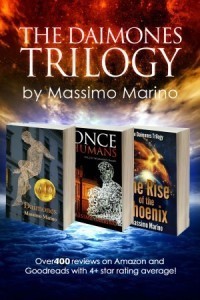What Publishers Don’t Want You To Know

SELF-PUBLISHED: James Augustine Aloysius Joyce (2 February 1882 – 13 January 1941), Irish novelist and poet, was considered to be one of the most influential writers in the modernist avant-garde of the early 20th century.
Julia Petrakis writes to us from the IndiePENdent.org organization.
The avalanche of self-published books creates a problem of legitimacy. Therefore, a group of us, authors and editors, is now forming a nonprofit organization, The indiePENdents, with the purpose of establishing standards and promoting independent writers. We will try to enlist the support of Amazon, Barnes&Noble, LuLu and mainstream publishers in creating standards and awards.
Authors write books. They represent the future of our culture. The indiePENdents want to give the creativity of the self-published authors an imprimatur, so to speak, in order to achieve the respectability and credibility that they are not presently given by the industry. Books that meet the standards will be awarded the indiePENdents’ Seal.
Julia: “As some of you may know, I have been for many years and still am an editor and back-of-the-book indexer. I work for traditional presses, think tanks and associations, individual academics and writers, and the A.T. Still University Student Writing Center. Until recently, as indexer, I received the final galleys or proofs, which had been copy edited and proofread; I found very few typos, inconsistencies, grammar or punctuation mistakes. Consequently, I did not know the quality of the writing of these educated, intellectual writers.
In the past month, I have been privileged to index for one of the major international academic presses and am currently indexing an edited compilation for a small association. Both books apparently came to me with little or no copy editing or proofreading and were/are full of errors. The first, a scholarly work of 300 or so pages, came to me with close to 100 queries and corrections. In the second, also a scholarly work, of which I have completed indexing 50 pages, I have already found approximately 50 queries and corrections. These range from inconsistencies in spelling and capitalization to incorrect book titles to sentences that make little or no sense.
Now, I am assuming these problems will be fixed before these books go to press. As they are, these books would not receive the indiePENdents’ Seal of Approval.
“So what does that mean for us?” you ask. What it means is that trad-published writing is not necessarily any better than self-published writing. It is just usually edited, copy edited, proofread, then checked again by the indexer and the compositor (modern-day typesetter) and then, once again, by the author before going to press, after which it is likely checked over again before the print run is approved. At the self-publishing level what this means is there will be many early drafts and even quite a few “final” drafts. (When Jasha Levi, our founder, and I published his book, Requiem for a Country: A History Lesson, on CreateSpace, we went through — and I still have on my computer — at least 10 of those “final” drafts).
Copy editing and proofreading do count. They are what takes a book from the “crap” critics of self-publishing so disparage to the level of those lucky few that make it past the trad-publishing gatekeepers and onto the NY Times best-seller lists.. The best of those books (whether they happen to be in a style or genre you like or not) have been polished until they shine like the best silver! Keep that in mind.”
Thank you, Julia, for sharing your words with us. This testimonial—and from someone who like you has seen it first hand—should be read once a week. “The avalanche of self-published books creates a problem of legitimacy,” and publishing houses are desperate to make readers believe that without their ‘imprimatur’ a writer is not worth to be read, but good writers write from every place and in every position. Today’s digital revolution in publishing hurts the middleman of the relationship that blossoms between authors and readers, and the middleman is one man too many in that relationship and needs to re-invent his role in this new era.
Today, writers write and readers read; in this equation all important factors are present, and for a writer that’s all that counts.
Thanks to the indiePENdents, and other organizations with same purposes and goals, for promoting good independent writers, at least those who have many ‘final’ drafts before sending the manuscript to beta-readers, get one more ‘final’ draft in the hand of the editor, and have a proofreading before hitting the ‘publish’ button.
Keep in mind that, as an independent author, it is also your role to help eliminate valid cause for negative perceptions of independently published books based solely on their publishing provenance. Write good stories, but don’t stop there. Rewrite, rinse and repeat, polish and have them polished until they shine before enjoying the privilege of being read by readers.
Massimo Marino is a scientist envisioning science fiction. He spent years at CERN and The Lawrence Berkeley Lab followed by lead positions with Apple, Inc. and the World Economic Forum. He is also co-founder of “Squares on Blue”, a Big Data Analytics service company.
Massimo currently lives in France and crosses the border with Switzerland multiple times daily, although he is no smuggler.
As a scientist writing science fiction, he went from smashing particles at accelerators at SLAC and CERN to smashing words on a computer screen.
He’s the author of multi-awarded Daimones Trilogy.
His novels have received the Seal of Excellency from both AwesomeIndies.net and IndiePENdents.org
• 2012 PRG Reviewer’s Choice Award Winner in Science Fiction
• 2013 Hall of Fame – Best in Science Fiction, Quality Reads UK Book Club
• 2013 PRG Reviewer’s Choice Award Winner in Science Fiction Series
• 2014 Finalist – Science Fiction – Indie Excellence Awards L.A.
• 2014 Award Winner – Science Fiction Honorable Mention – Readers’ Favorite Annual Awards
His novels are available from Amazon, Barnes & Noble (Nook), iTunes Apple Store, and many other retailers around the world.
Join his mailing list for new releases, or follow him on Facebook, Google+, and Twitter.
The post What Publishers Don’t Want You To Know appeared first on § Author Massimo Marino.




